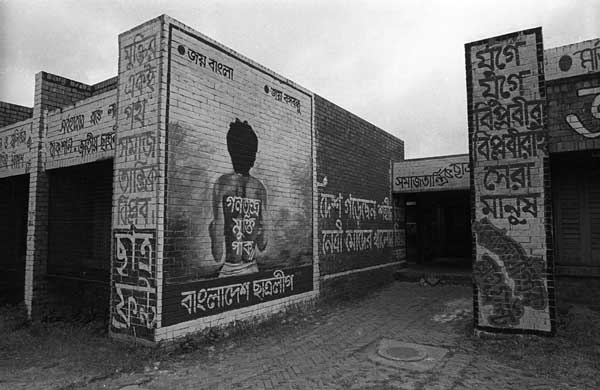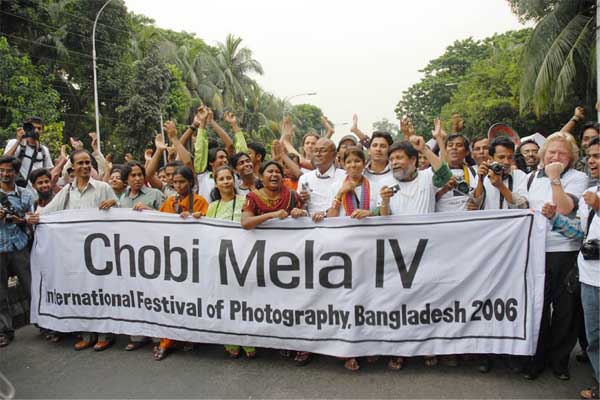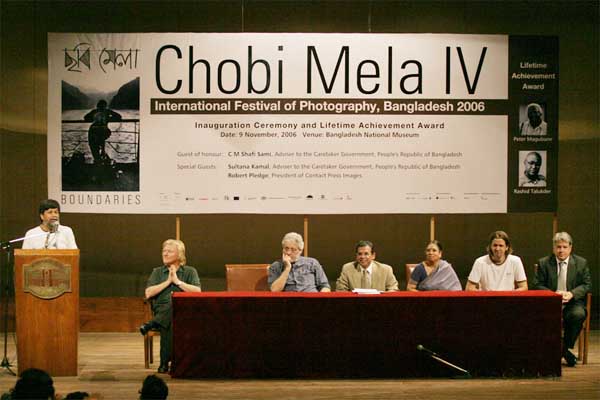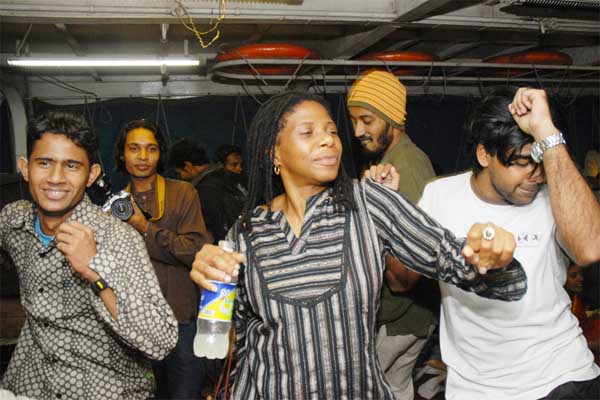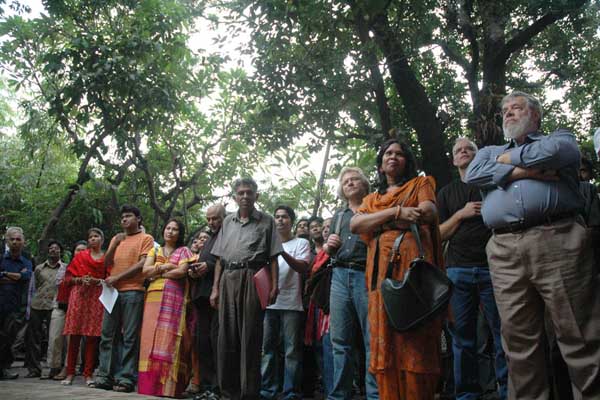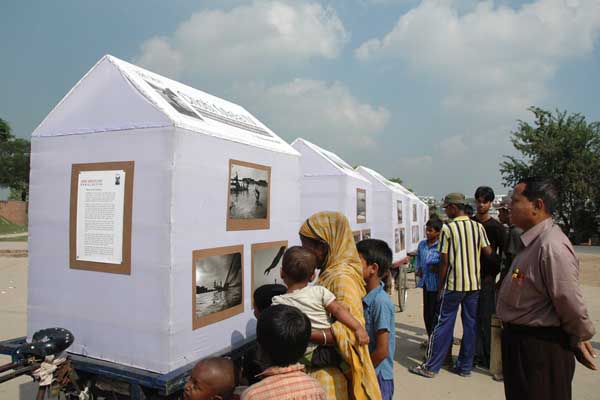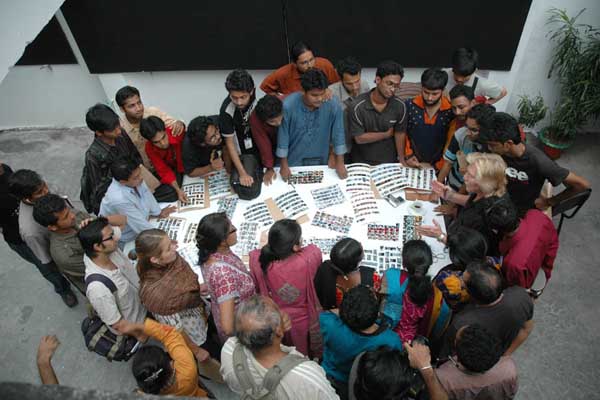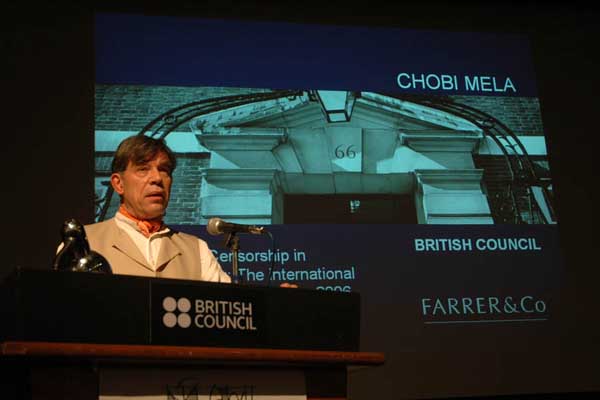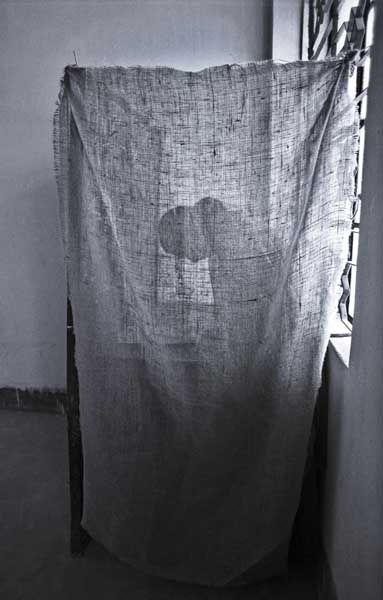![]()

?Come out we won’t shoot?, they had yelled out over the megaphone. Not the most alluring of invitations, particularly when it is from a police van surrounding your flat at midnight. They had thought we were hiding someone and after searching our rooftop had come into our flat. As they left, I had gone out to take pictures from our verandah. Rahnuma had turned up the television volume to hide the sound of the shutter on my Nikon 501, but it still seemed to make a very loud click. Luckily, I wasn?t noticed. It was the 2nd December 1990. Ershad?s autocratic government was feeling the heat. 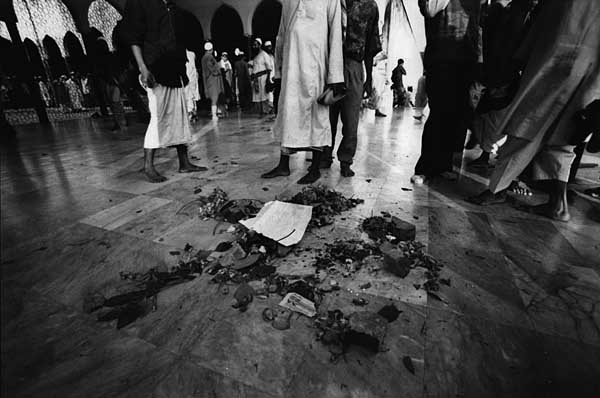
Two days earlier, after the Friday prayers, they had opened fire on the Baitul Mukarram mosque killing a man.
Lawyers had played an important role in our democracy movement. They had upheld writ petitions against the government, and when the government tried to flex its muscles, they came out in protest, united in their stand.

On this day, exactly sixteen years ago, barrister Shahjahan, Sarah Hossain and other lawyers were meant to meet at Drik. We were monitoring the government action, and were ourselves under scrutiny. My colleagues had warned me that plain clothed detectives were looking for me at the office. The detectives seemed to know we lived in Lalmatia, and my colleagues suggested that we stay elsewhere that night. Ma (Rahnuma?s mum), Rahnuma, Tehmina (a lawyer friend of ours) and I went over to Saif and Rini?s flat in Dhanmondi Rd 8. This was not the time for taking chances. The media too had played their role. When censorship became intolerable, they refused to publish. It was that night that Ershad had announced on television that he was going to step down. People were rejoicing in the streets. The following morning the first newspaper was out.
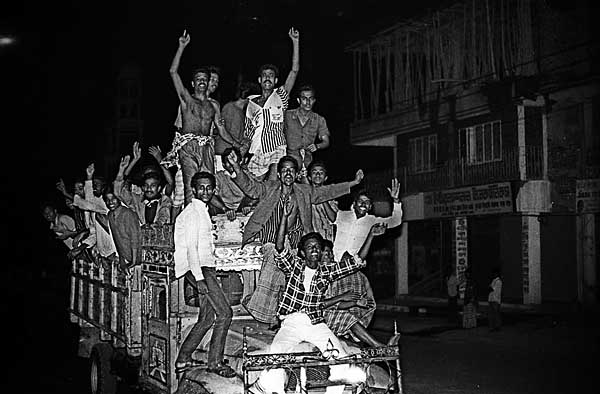

We all went out into the streets. Altaf on his motorbike, me on my bicycle, and the others in whatever transport they could find.

A little girl walked down Mirpur road with a bouquet of flowers in her hand. She too was celebrating the return of democracy. People were dancing in the streets. In Paltan, too often the scene of violence, people gathered in ones and twos.

Men and women in their sleeping clothes, some with children, gathered in the winter night. Chatpati wallas sensing a business opportunity appeared out of the fog. At about 1:30 am Shimul Billa, Bangladesh’s Shirley Temple, sang out ?Bichar poti tomar bichar korbe jara, aj jegeche ei jonota?.

The song ?O judge, the people have risen, it is now the day of your judgement?, was strangely prophetic.
And now in 2006, the chief justice of the supreme court intervenes to prevent a decision
going against a political party, lawyers ransack the court, a president with zero credibility heads a caretaker government, and of all people, Ershad himself is in the streets, demanding the removal of the current president, while Moudud, the chameleon survivor, then Ershad’s right hand man, now holds hands with the chief justice.
4th December 2006
Delhi
Category: Governance
The Campaign Begins
![]()
“We travel to Dhaka, in Bangladesh for a celebration of South East Asian photography thanks to a festival called Chobi Mela, on its fourth edition so far. Their theme this year is ‘boundaries’: ideas, aspects, images that divide peoples and cultures. Perfect backdrop for the violence in the country ahead of forthcoming elections…” http://www.bbc.co.uk/worldservice/programmes/the_ticket.shtml. They did a hatchet job on Anita’s interviews, but at least the BEEB did give coverage to Chobi Mela IV.
Besides Cristobal (asleep on the rickshaw) and Norman, all the others have gone back.
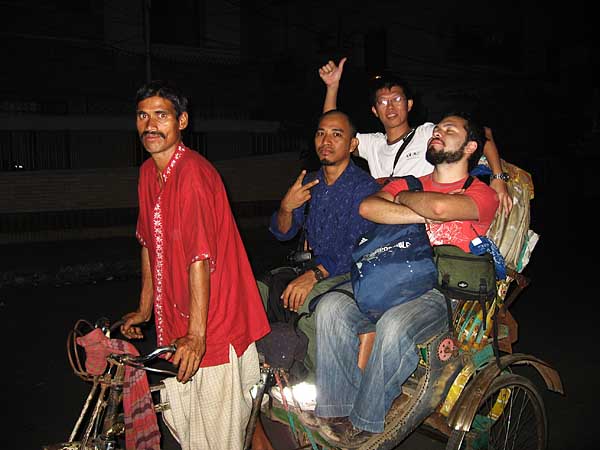
Richard, Wubin and Cristobal, testing out environmentally friendly modes of transport.
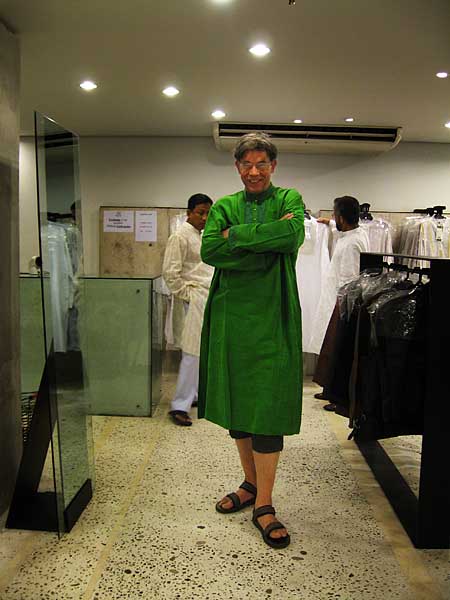
Rupert claims his neighbours need sunglasses to cope with his glistening green punjabi from Dhanmondi Aarong.
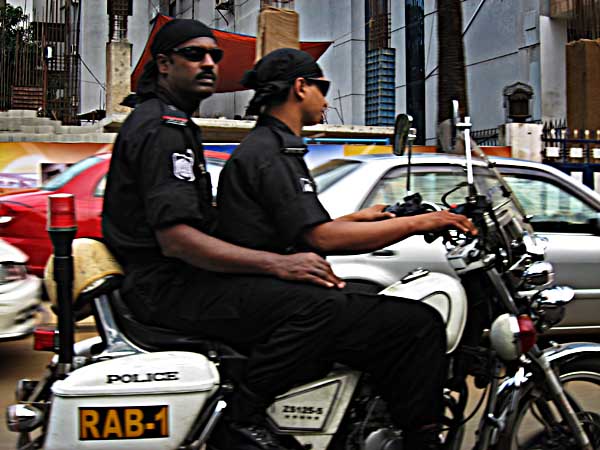
The Rapid Action Battalion (RAB) motorbike cruised slowly past Drik in the morning. Earlier I’d seen them cruise in Gulshan and Baridhara. It was like a scene from Easy Rider, though the ‘crossfire’ victims might not think so. I’ve never seen them in the troubled areas of Paltan, or Muktangon, or anywhere there are clashes between the public and the police. The RAB seem to have different priorities. For the moment at least, the elite force seems only concerned with protecting the elite.
Meanwhile, a Chief Election Commissioner (CEC) takes a strange and undefined ‘leave’, with veiled threats of “I shall return”, and the fighting gives way to election frenzy.
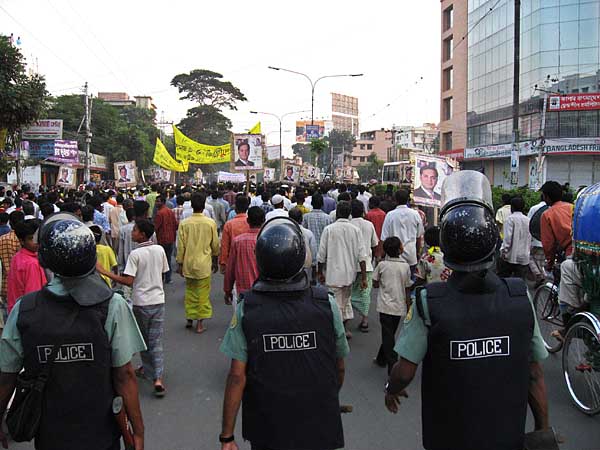
The Police in a different role
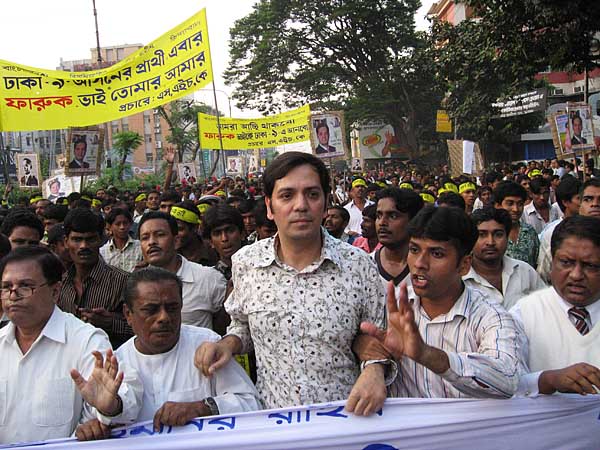
The campaigner, a new kid on the block

Hired supporters, a new form of employment
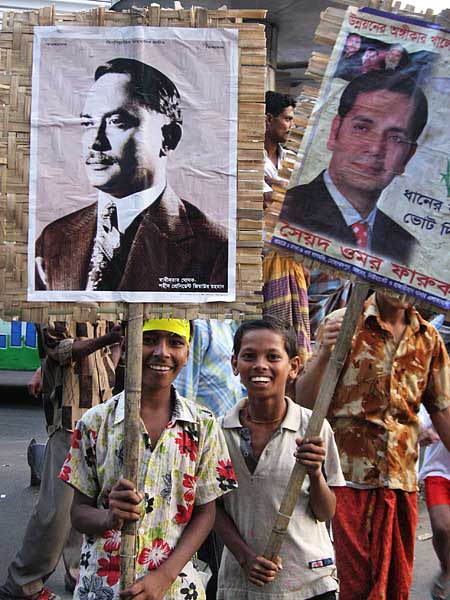
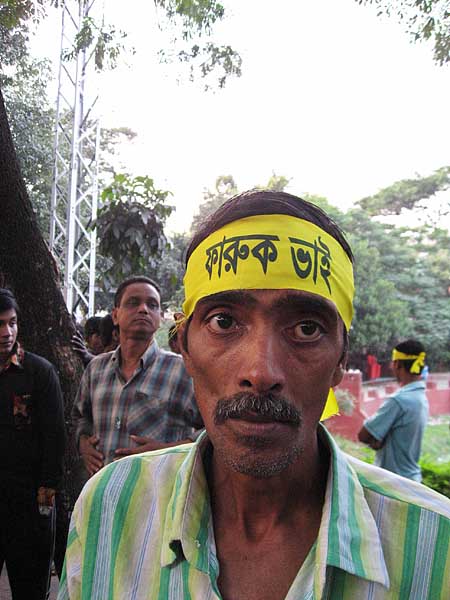
Employment for all

And the inevitable traffic jams
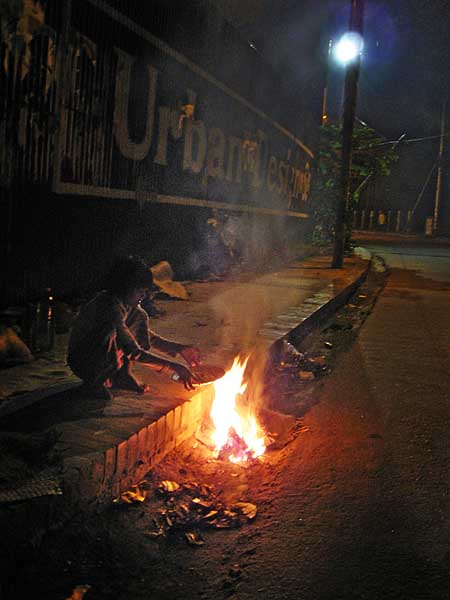
For those trying to avoid the winter chill, the priorities are somewhat different. A girl cooks dinner at Russel Square. Earlier the burning cars provided the flames.
Stretching the Deadline
![]()
An extra day! Not unusual in itself, but considering that a deadline had been announced so long ago, it seems a strange thing to ask for. What could happen in that extra day that could not have happened before? This extra day brings fresh violence, and while the advisers give us hope of ‘light at the end of the tunnel’, it is unfortunate that yet more loss of life continues while the politicians do their tap dance. If the Chief Election Commissioner (CEC) is to step down, he should do so soon. The presence of a party appointee as head of state, head of military and head of government is bad enough. An appointee Chief Election Commissioner armed with a rigged voter list simply cannot be the basis of a fair and free election.
If there be a genuine belief in a multiparty system, the process must involve, putting in place a caretaker government with backbone, and accepting a free and fair election regardless of the outcome.
Providing electricity, ensuring wage increase for garment workers, eliminating rampant corruption and ensuring freedom from extortion and ?crossfire? are far better means of ensuring support, than empty rhetoric, paid goons and spineless sycophants in key positions. There is more blood on the streets today. It is time politicians were made accountable.
It was Nasreen’s birthday on the 18th, but though friends gathered in their Dhanmondi home and sang songs, and Jamila stayed her chirpy self, gloom pervaded the air. The article in the Daily Star brought up renewed doubts about corruption, cover-ups and selling out the country.
Pathshala alumni Monirul Alam is on vigil outside President House. The expectation is that the CEC will be bringing his resignation letter. Drik photographer Shehab Uddin is in Nepal following the peace agreement. Perhaps we too can hope for peace.
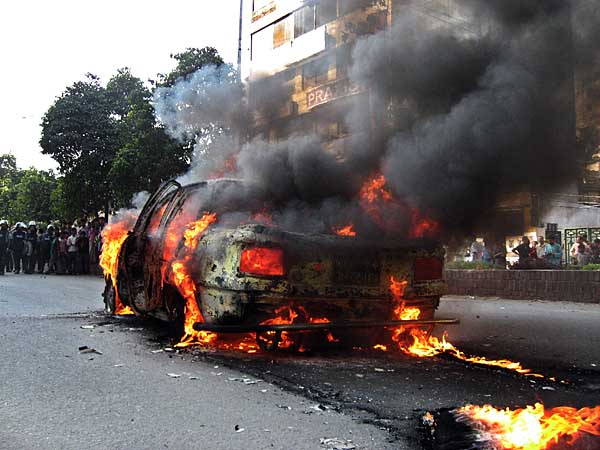
Burning car at Russel Square, close to Pathshala earlier in the afternoon.
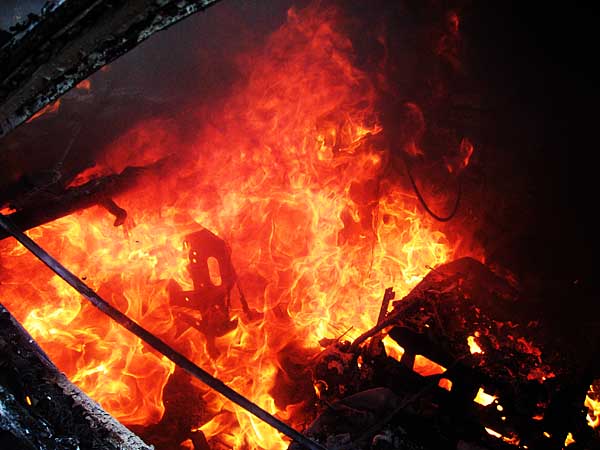
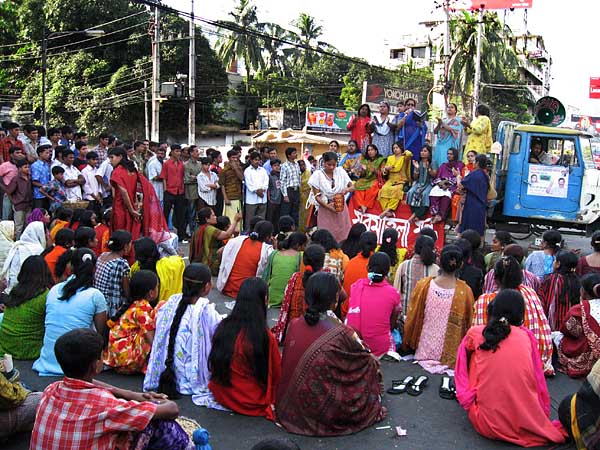
Singing in Mirpur Road
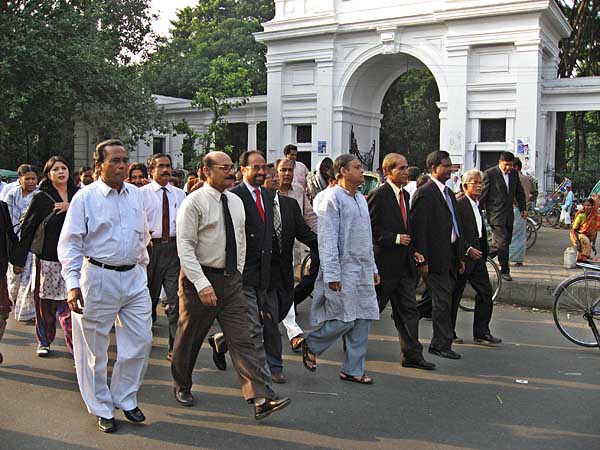
Protesting lawyers coming out of the Supreme Court
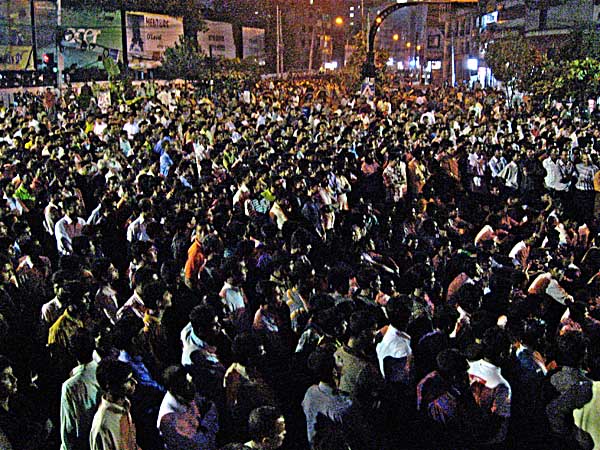
Open air concert at Russel Square last night.
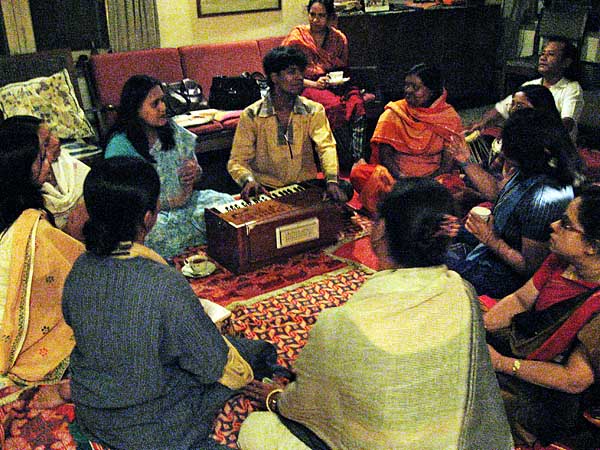
Friends singing on Nasreen’s birthday
Chobi Mela IV continues despite it all. Rashid Talukder opened the splendid exhibition resulting from Morten Krogvold’s workshop, at Shilpakala Academy.
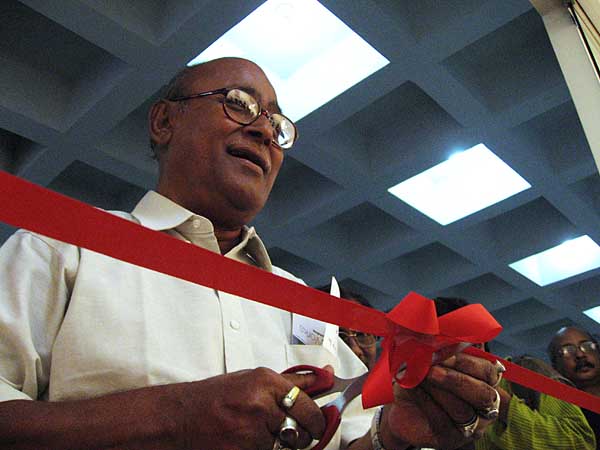
Despite my scraggly beard, Torsten thought I was Father Christmas when I went to drop off the Chobi Mela gift packs at the Goethe Institut, insisting that he teach me the German song that Santa Claus would have sung.
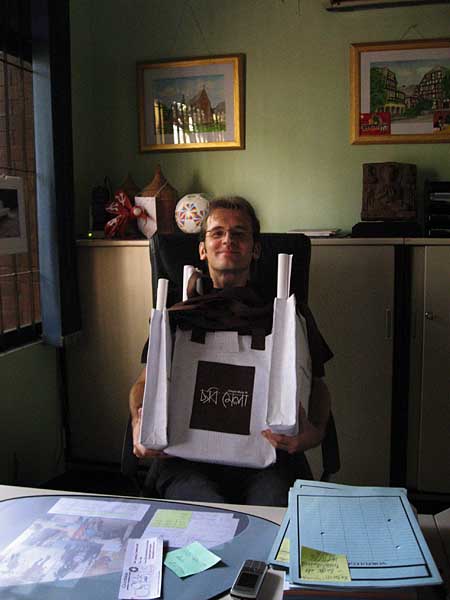
Two and a half years after the opening of the gallery, the airconditioners had still not been installed, but the viewers were not to be deterred, nor were the rag pickers outside Drik, Shanta and her friends, who decided the cool open space of Drik’s new gallery was the best place to try out their break dancing routine.
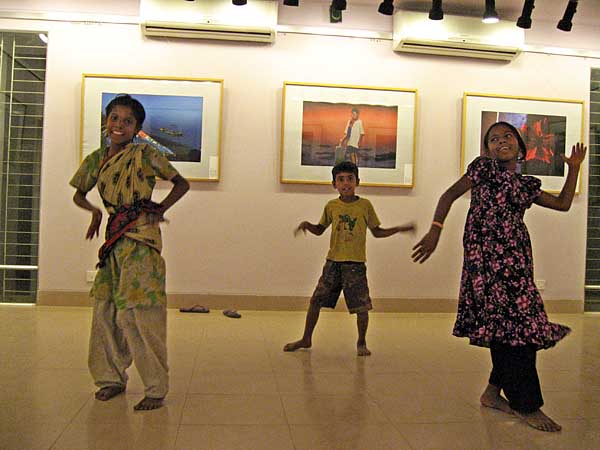
I am sure my pictures on the walls enjoyed their dance. I know I did.
Taking care of the caretaker
It was a dramatic ending to Robert Pledge?s presentation. Via Topu and Omi, I?d received the news that the military had been called out. Robert wanted to finish the presentation, but once I?d announced the government?s decision, the auditorium of the Goethe Institut quickly emptied out. This particular Chobi Mela IV presentation had come to an abrupt end. It was 1987 revisited.
Noor Hossain had painted on his back ?Let Democracy be Freed? and the police had gunned him down on the 10th November 1987. But the people had taken to the streets and while we were scared the military would come out, there was no stopping us. It had taken three more years of street protests, before the general was forced to step down. The people had won. But then it had been a military general who was ruling the country. This was a civilian caretaker government. The general mistrust of a party in power, had resulted in this unique process in Bangladesh where an interim neutral caretaker government headed by a Chief Adviser (generally the most recently retired Chief Justice) and consisting of other neutral but respected members of the public were entrusted with conducting the elections. Why then the military? Yes, the president was a Bangladesh Nationalist Party (BNP, the largest party in the outgoing coalition government) appointee, there are ten advisors who are meant to be neutral.
A free and fair election hasn?t yielded the electoral democracy we had hoped for. After each term, the people have voted out the party in power, only to be rebuffed by a political system that has never had the interest of the people on their agenda. Still, the elections were held, and despite the fact that there had been one rigged election in 1996 (rejected and held again under a neutral caretaker government), an electoral process of democratisation, was slowly developing.
This time however, the total disregard for the electoral process has created a sham, and the three key people in this electoral process, the president, the chief adviser, and the chief election commissioner (CEC), are colluding against the people. The first two, being represented by the same person, was a BNP appointee. He also happens to be the head of the military. The CEC, now a cartoon character, had also been appointed by the BNP while it was in power. Coupled with a clearly flawed voters list, this has removed any hope of a free and fair election. Can the caretaker government genuinely conduct a fair election? I believe it still can, if given the chance, despite the president?s lack of credibility. But for that to happen, the military, the bureaucracy and the police need to remember that it is with the people that their allegiance lies.
However, it does depend upon the removal of the other obstacles. The election commissioner cannot constitutionally be removed, and his removal is central to the opposition demands. What then can we do? There is only one body higher than the constitution, the people themselves. The advisors need to be empowered if they are to pull off this election. Sandwiched between a partisan executive head and another partisan CEC, the advisers risk becoming irrelevant. The only way this can be checked is if people come out in droves. Not ?hired for the day? supporters but ordinary people committed to civilian rule, and a multi-party system.
It is we the people who need to take to the streets. And it is time we sent out the message to all political parties, that an entire nation cannot be appropriated. They need to be told that we did not liberate our country in vain, and despite the poverty and the hardship that we go through, we will not be cowed down, and will not blindly tow a party line, when the party itself has disengaged from the people. If tomorrow, every woman man and child takes to the street of Bangladesh, there is no power, not the military, not the president, not the advisers, not the CEC, not the BNP and not AL that can stop us.
There is hope yet. The advisers have had the good sense to reverse the home ministry?s unilateral decision to call out the army and the president and chief adviser has been challenged for taking such a step. Whether the advisers can continue to take such bold steps depends on our ability to bolster their nebulous position.
Blockades and hartals do hurt the economy, and ironically, it is the person in the street who is the most vulnerable. But faced with an attempt to take away the only chance she has to exercise her right to elect the government of her choice, she has little option left but to take to the streets. As the world is finding out, in Iraq, in Afghanistan, and wherever else there is conflict, a military victory is never a victory. If the anger of the people is to be quelled, then the underlying causes of discontent need to be solved. Flexing the muscles of the military, will only put a lid on the boiling pot, and the longer the lid is pressed down, the bigger will be the eventual explosion. More have died today, and with every death, the flashpoint looms closer.
Chobi Mela IV has continued despite it all. The dancing in the all night boat party,
the heated arguments at every meeting point, the mobile exhibitions, all went on despite the turmoil. The presentations on the night of the 11th, with Yumi Goto, showing work by the children from Bandar Aceh, Neo Ntsoma showing her work on youth culture in South Africa, Chris Rainier showing his long term projects on ?Ancient Marks?, and the deeply personal, but very different accounts of Trent Parke
and Pablo Bartholomew, made one of the most intriguing evenings I can remember. The packed audience that had braved the blockade had perhaps an inkling of what was to come. Morten had a full house for his ?gallery walk? at the Alliance Francaise and Trent?s workshops were packed out. The grand opening was at the National Museum, where we had one fifth of the cabinet opening the show. Kollol gave a passionate rendering of his song ?Boundaries? written especially for the festival. The rickshaw vans designed to take the festival to the public, plied the streets of Old Dhaka, Mirpur and other areas not used to gallery crowds.
The chief guest, adviser C.M. Shafi Sami, the special guests adviser Sultana Kamal and Robert Pledge, photographers Morten Krogvold and Trent Parke and the scholarship recepient Dolly Akhter all spoke eloquently. Little did the audience know about the drama that had taken place the night before. With the museum functionaries doing their best to keep us from putting up the Contact Press Images show (http://www.chobimela.org/contact_press_images.php), we were under pressure, but working all through the night and sleeping on the museum floor, we managed to put the show up on time.
Last night, the empty streets, looked ominous as I dropped off Chulie, Robert and Yang, and people have been dying in the streets.
Since then we have had Morten Krogvold?s passionate presentation at the gallery walk at Alliance, Rupert Grey?s clinical dissection of the law and his dry British humour,
both at the British Council and the Goethe Institut, Saiful Huq Omi?s disturbing but powerful images of political violence, Cristobal Trejo?s poetic rendering of an unseen world, Richard Atrero De Guzman?s honest response to difficult questions about representation and my own presentation on natural disasters and their social impact have all been well attended, despite the tension in the desolate Dhaka streets. The evening presentations close tonight with an insightful film by Indian film maker Joshy Joseph, presentations by Norman Leslie and a behind the scenes look by the photographers at the Drik Photo Department, Md. Main Uddin, Shehab Uddin and Amin, Chandan Robert Rebeiro, Imtiaz Mahabub Mumit and Shumon of Pathshala and Mexican exhibitor Cristobal Trejo. The shows go on as they always do at Drik.
In 1991, a woman with her vote had avenged Noor Hossain’s death.
A fortnight ago, the city was in flames, and a stubborn chief election commissioner is stoking the flames again. It is a fire he and his allies will be powerless to stop.
Shahidul Alam
Dhaka
Chobi Mela site
Blog by Australian curator Bec Dean
Short video on Chobi Mela IV
Dhaka Burns
![]()
Well I’m finally stumped for words. A party affiliated president, now
has the triple roles of president, head of the military and head of
the ‘neutral’ caretaker government. While rumours of a military
takeover abound, and the prime minister’s son threatens that they will
not go to the streets ’empty handed’, the news that the leader of the
opposition has not threatened immediate protests, but has rather opted
to see how the new head of the caretaker government conducts himself,
is a healthy sign. Too many lives have already been lost.
A lot of changes need to take place to erase the mistrust created. A
genuinely non partisan group of advisers need to be selected, the
election commission and the voters list, both clearly not neutral,
need to be changed, and he has to clearly demonstrate that he is no
longer a puppet. Unlikely based on his track record, but one can hope.
Given the current mood, another sham election will surely light the
fuse.
Shahidul Alam
29th October. Dhaka
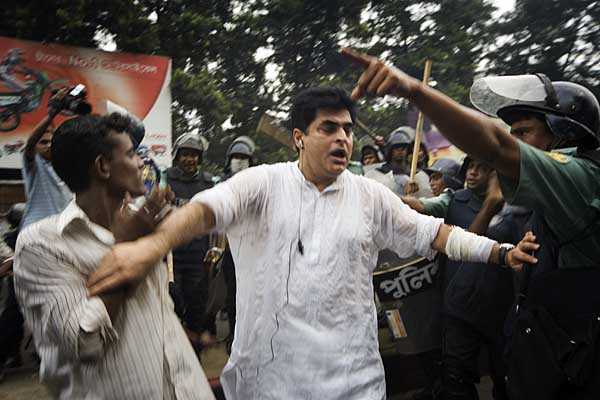
Clashes between opposition and Jamaat due to demand for neutral head of caretaker government. (upload incomplete)
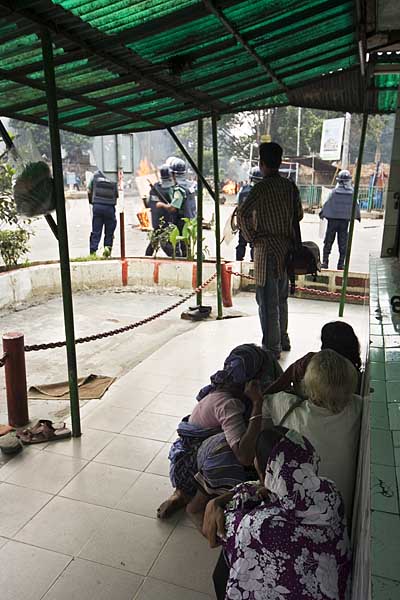
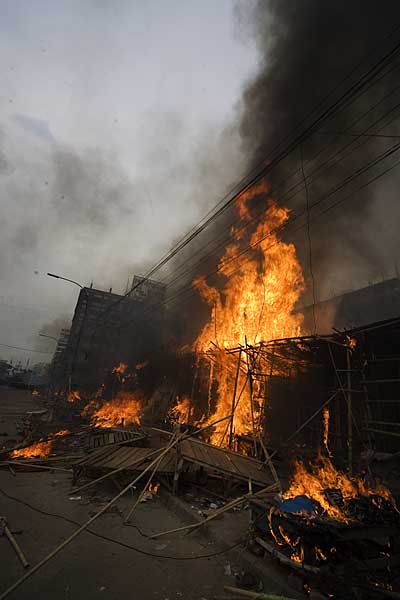
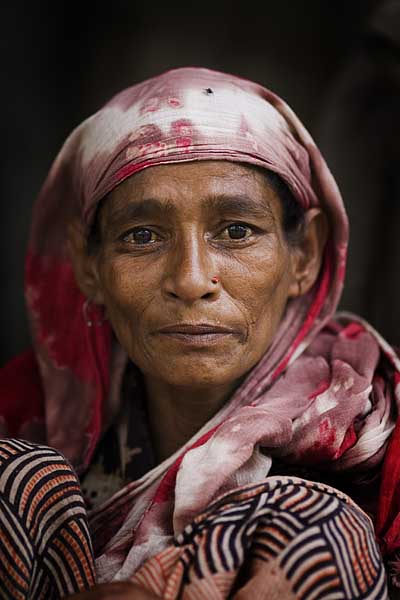
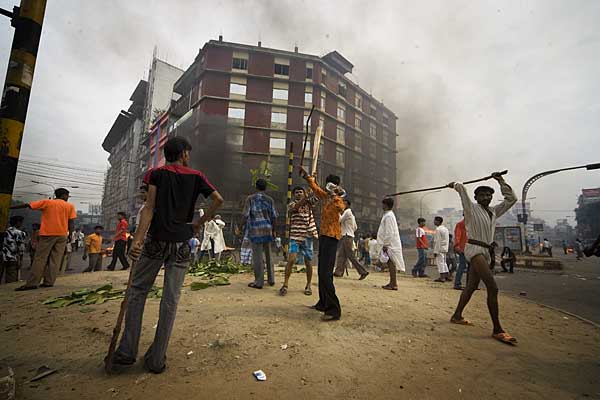
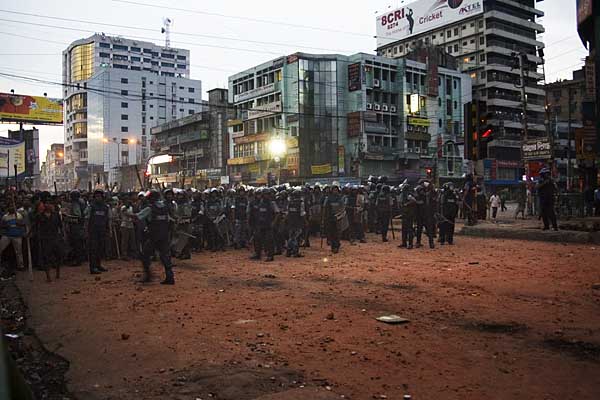
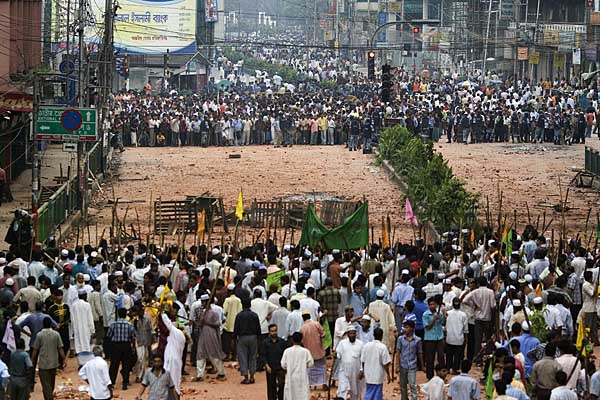
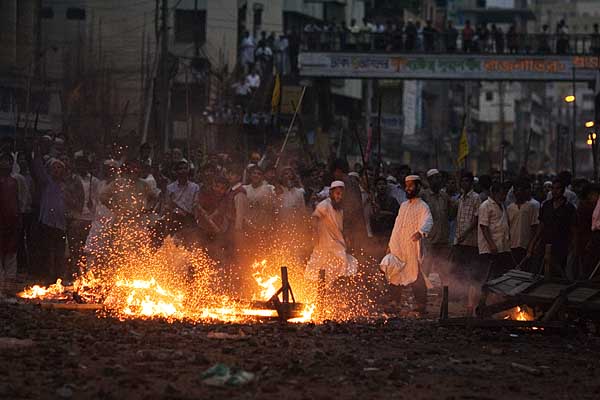
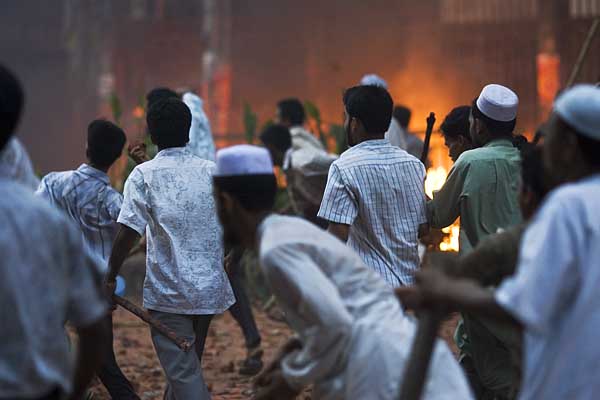
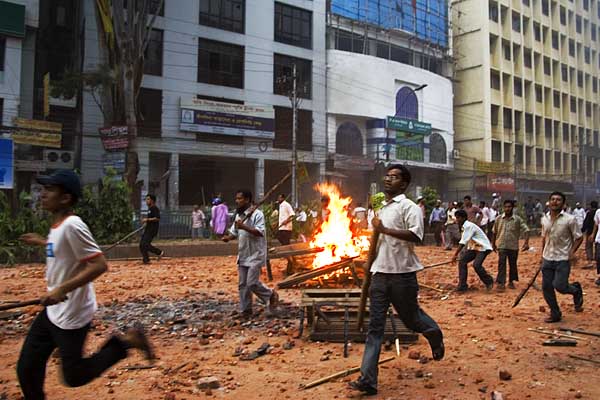
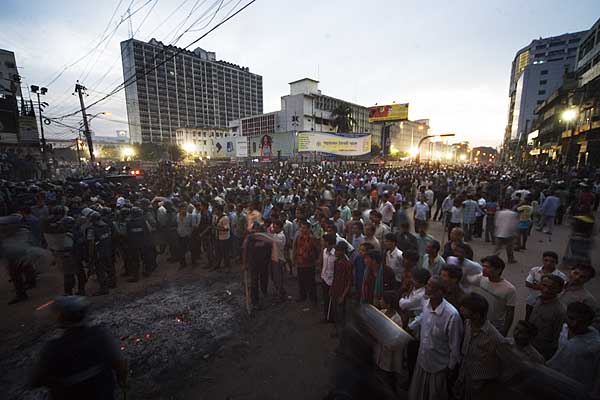
Above photographs taken on 28th October 2006 by Shahidul Alam.
And today 29th October 2006, a party affiliated president, makes himself president, head of military and head of ‘neutral’ caretaker government. Today’s photographs taken by Shehab Uddin. No unauthorised copying of any kind. To publish these or high res images, contact library@drik.net. More pictures and text to follow.
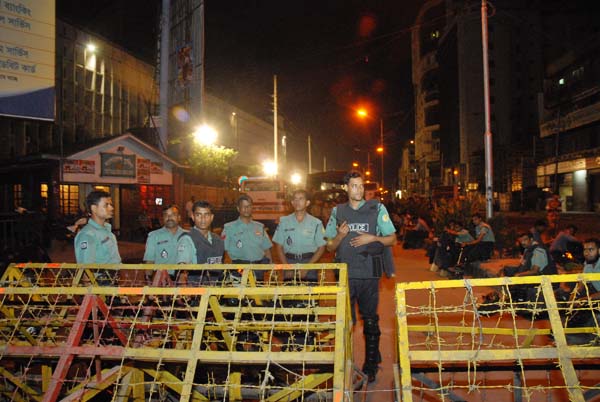
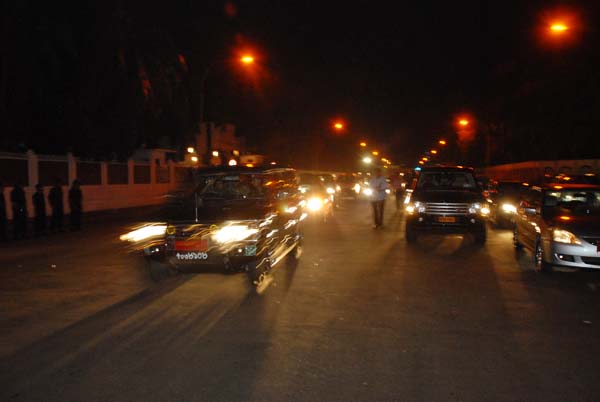
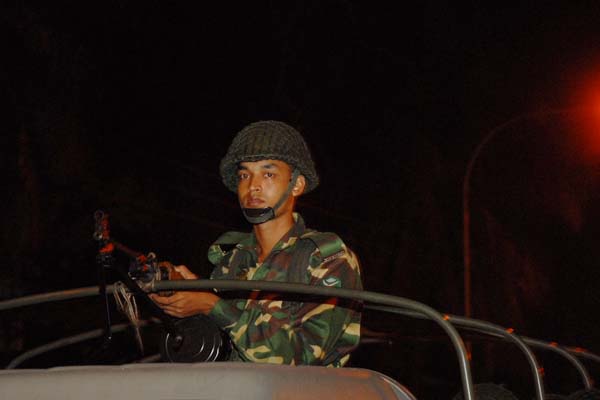
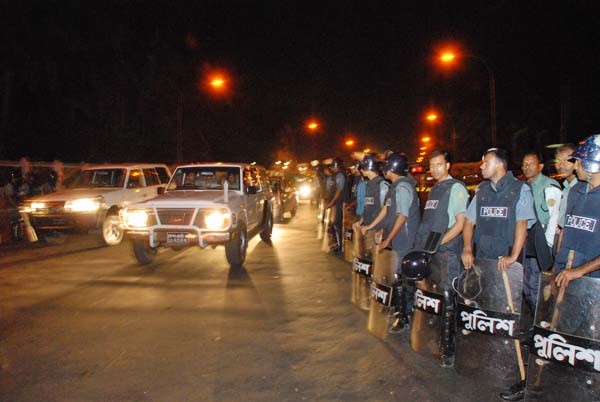
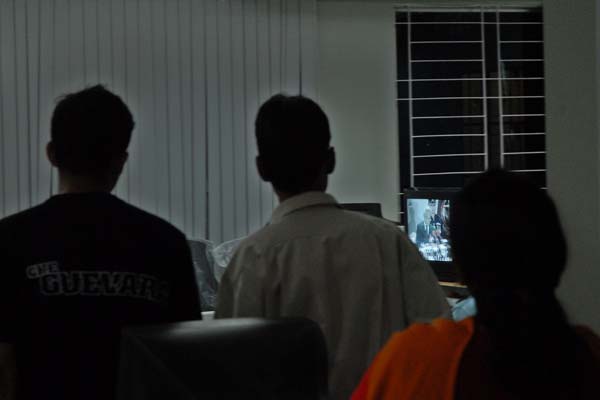
Thailand coup d'?tat
?There?s been a coup d’?tat,? said Cherrie breaking into our meeting at the Imperial Tara Hotel in Bangkok. Some of the participants have just returned from shopping and there were little signs of the unrest that it implied. My camera had been handed in for repairs, and my first instinct was to see who had one I could borrow. Suvendu kindly and only half reluctantly offered his. Zaheer and I decided to go out, but he returned soon afterwards, seeing the pouring rain.
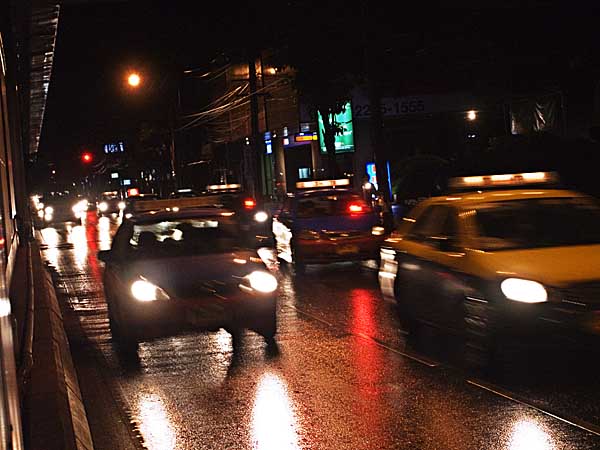
There was some housekeeping to be done. Several participants were due the next day and decisions needed to be made as to whether they should make the trip. Spending as little time as I could get away with, I clutched Suvendu?s camera and broached the rain. Some shops had closed, but there were people in the streets. The Japanese restaurant at the end of Sukhumvit Soi 26 wasn?t full, but did have customers.
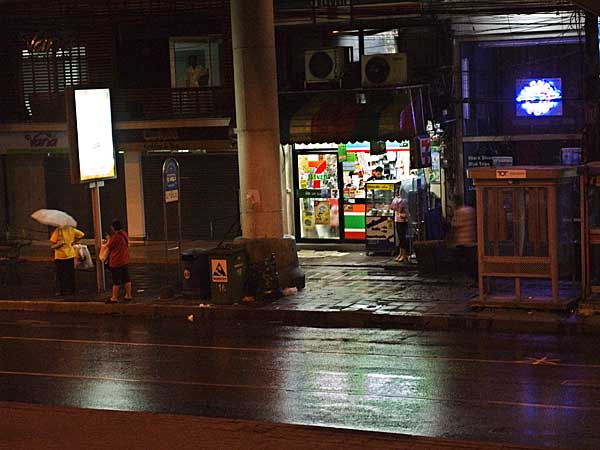
Zaheer needed a SIM card, but the girl in the 7/11 simply said ?no card?. Military takeover, or political unrest didn?t seem to pervade the air.
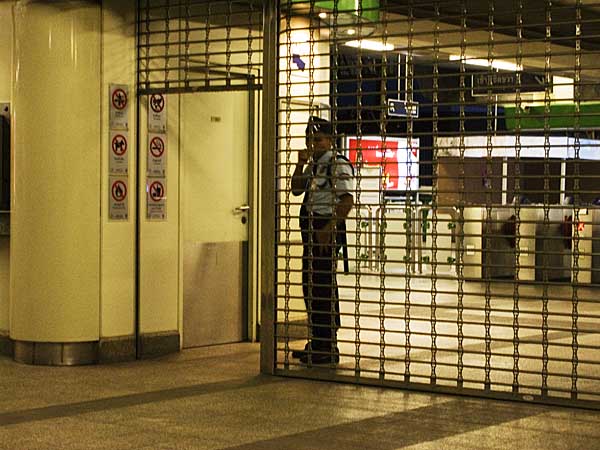
The train station was closing, perhaps a bit earlier than usual as it wasn?t midnight yet, but the traffic in the streets seemed normal. People outside the 7/11 waited for the bus as they normally do.
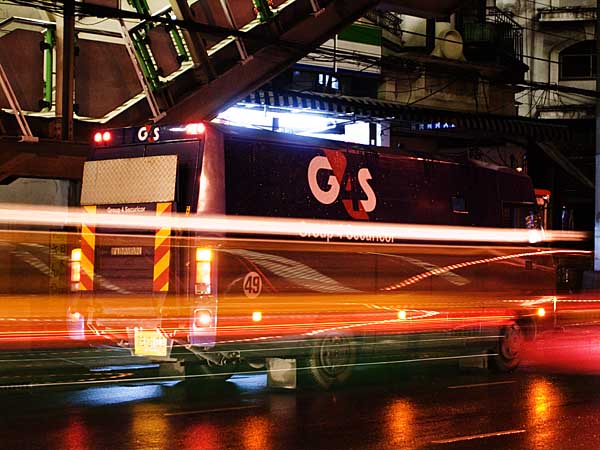
Must try and sneak out of the meeting tomorrow to go downtown where the tanks are meant to be, but here the only sign a conspiracy theorist could use as ammunition was the Securicor car waiting outside the bank. Perhaps an ominous sign.
Shahidul Alam
Imperial Tara Hotel
Bangkok
Profits versus the Poor
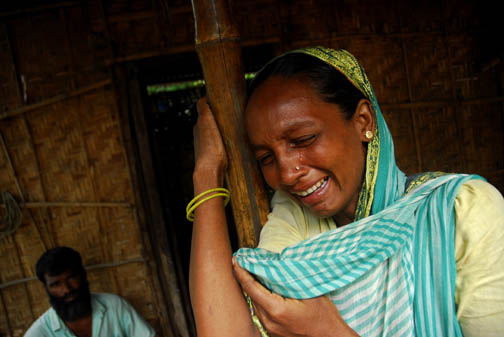 ?I have lost a son, maybe I?ll lose another, but I won?t let them setup a coalmine here.? To Tahmina Begum who had lost her son Toriqul to police bullets, her land was also her family.
?I have lost a son, maybe I?ll lose another, but I won?t let them setup a coalmine here.? To Tahmina Begum who had lost her son Toriqul to police bullets, her land was also her family. 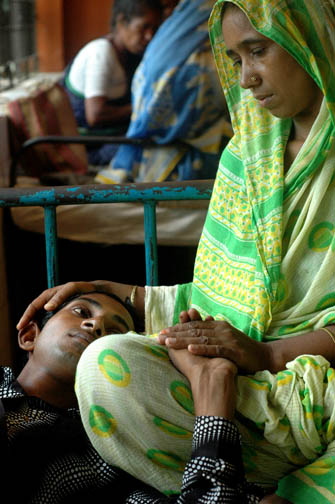 It could have been a ?B? rated western except that it is set in the east.
It could have been a ?B? rated western except that it is set in the east. 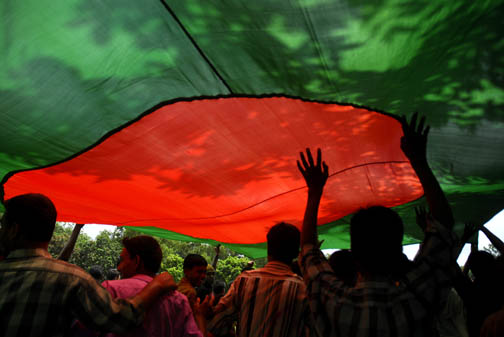 People wanting to hang on to their ancestral land versus mining companies wanting huge profits. There have been only minor changes from previous scripts. When farmers wanted fertilizers and seeds, the police had opened fire killing them, when they wanted electricity to irrigate their soil, the police had opened
People wanting to hang on to their ancestral land versus mining companies wanting huge profits. There have been only minor changes from previous scripts. When farmers wanted fertilizers and seeds, the police had opened fire killing them, when they wanted electricity to irrigate their soil, the police had opened 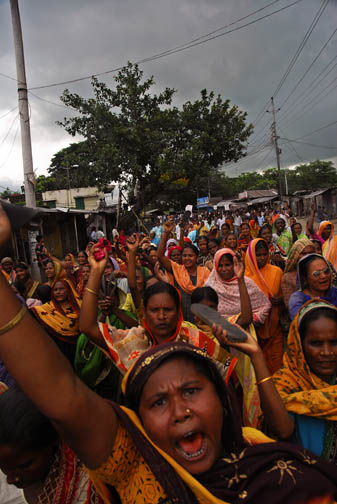 fire killing them. Now that they want to retain their land rather than have it converted into coal mines again the police have opened fire killing them.
fire killing them. Now that they want to retain their land rather than have it converted into coal mines again the police have opened fire killing them. 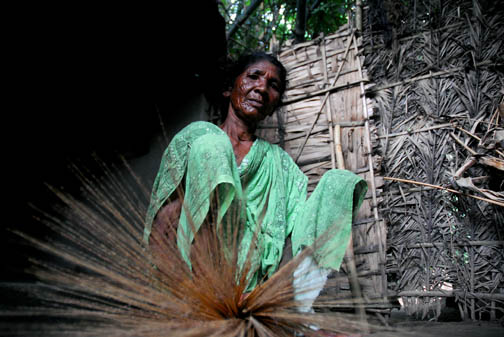 The Shaotals, being indigenous minority groups, find themselves even more vulnerable within this persecuted community. In the shootings on the 26th September 2006, in Phulbari, Dinajpur, in northwestern Bangladesh, at least six villagers are known to have been killed, over a hundred are said to be missing.
The Shaotals, being indigenous minority groups, find themselves even more vulnerable within this persecuted community. In the shootings on the 26th September 2006, in Phulbari, Dinajpur, in northwestern Bangladesh, at least six villagers are known to have been killed, over a hundred are said to be missing.
Sitting on a man’s back
![]()
Three bombs had gone off the day before, and they weren’t comfortable about me walking on my own in the streets of Kabul.
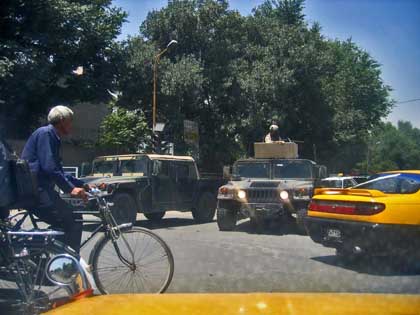
The driver insisted that he gave me a lift. The suggestion that a particular hill not too far away would give me a good view of the city was a good one, and the late evening light was just leaking through the haze. He offered to stay to give me a lift back, but I wanted to be on my own, and writing down that I needed to get back to Choroi Malek Asghar, I wandered off, free at last. Coming down the hill, I wandered through the back streets as I tend to do in cities I am new to. An odd conversation in my broken Urdu helped. As always kids wanted to be photographed, and wherever I went, people offered me cups of tea, or invited me home.
Abdul Karim latched on to me. Insisting that I visit his family, he took me through the narrow winding mud path that led to the tiny doorway that was the entrance to his home. My first task was to take photographs of the family. I had none of the language skills he had, but it didn’t seem to matter. Initially surprised by this stranger the man had brought home, the family quickly turned to more important things, like being hospitable to this mehman (guest).
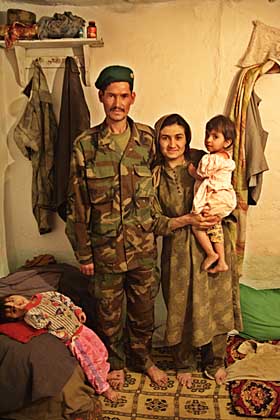
I gesticulated wildly enough to convince them that I needed to catch the light while it was there, and Abdul Karim became my self appointed guide. I could go and take some photographs, but was to come back and have tea. The sun had almost set by the time we were back up the hill. A lone runner ran circles around the flattened top of the hillock. Football fever had set in and the shouting of the kids chasing a ball in the dried up swimming pool in the centre, carried through the evening sky. Four young men came up and made conversation. Two of them had been to Pakistan, and we spoke in Urdu and in English. One was an out of work webmaster, and wanted my email address. They posed, I photographed, and he scribbled his email address so I could email the picture back.
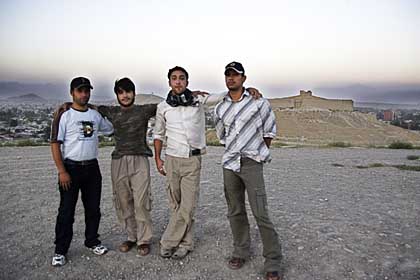
The sun had set and Abdul Karim wanted me to keep my end of the bargain. The young men also wanted me to visit their homes. Perhaps they could take me out the following day they suggested. They knew great places for photography. We exchanged mobile phone numbers. Undiplomatically, I suggested that perhaps they too could come to Abdul Karim?s and then I could go with them to their homes. One young man took me aside and explained that they couldn’t go. It would be breaking purdah. I wondered how I had become an exception to the rule.
Abdul Karim, his mother, Bibi Shirin, his wife Ayesha, and their two children Mehjebeen and Sufia lived in this one room flat. There were mattresses on the floor and one television set and one radio. There was a tiny courtyard and metal steps that went up to what looked like a loft. Abdul Karim had worked as an engineer in the marines and was now out of a job. He showed me the children’s book he used, to try and teach himself English. Even with body language and the best of intentions, our communication faltered, but there was no mistaking that I was a welcome guest, and my major challenge that evening was leaving without having dinner with the family. The path outside was by now pitch black, and Abdul Karim walked me through the maze and got me to a cab. We parted with some sadness.
Back at the Aina office where I was staying, the guard with the Kalashnikov welcomed me with a smile. I could see why my colleague Nazrul hadn’t left the compound for the last two months.
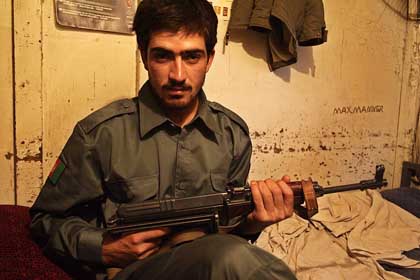
Day before yesterday we drove up to Salang, past the bombed out ruins of what had been thriving villages, past the tank carcasses, past vast stretches of barren land, interspersed with lush foliage by the river beds. A young man took great pleasure in racing his steed against our minivan. Two boys flagged me down, insisting that their friendship be recorded in my camera.
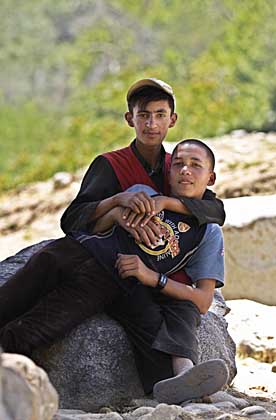
Back in Kabul, I did walk out on my own, without an escort, and went to the marketplace. The men in the bakery insisted that I try their freshly baked bread and I briefly sat with new found friends and watched Hindi films in the restaurants.
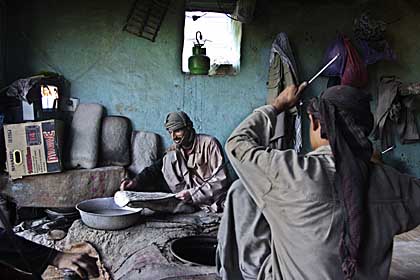
I spoke to Arif who ran a small studio, and came across the out of work labourers in the market square looking for work. A child and an old man reached into the gutter to pick up a polythene bag they could sell. It was in a worker’s face that I realized why people who are capable of so much hospitality, and are so willing to give, have become objects of terror to the foreigners who live here.
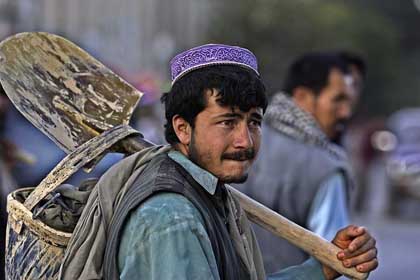
They want the very things that the west has officially championed. Jobs, security, a home for their families and for their land to be free of occupation.
Organisers at the Sarina Hotel claimed it was the first fashion show in 20 years in Afghanistan. There were few tell tale signs of the riots that had taken place here a few days ago. But the white Land Rovers outside, four sets of security barriers, and the armed US soldiers on guard, marked the distance between central Kabul and the rest of the country.
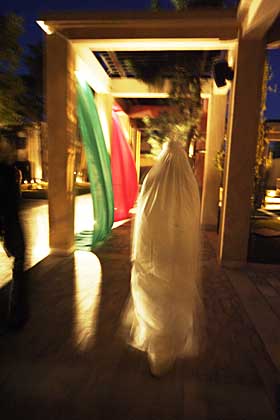
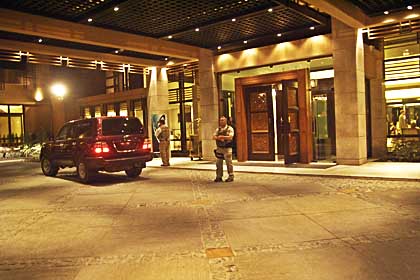
I remember Tolstoy’s words “I sit on a man’s back, choking him, and making him carry me, and yet assure myself and others that I am very sorry for him and wish to ease his lot by any means possible, except getting off his back.” They seem to have learned little in 120 years.
Choroi Malek Asghar
Kabul
9th July 2006
Colliding with the State
![]()
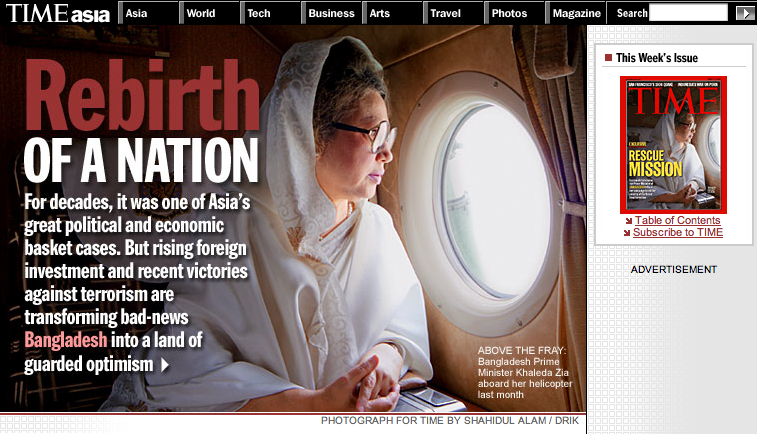
Lisa Botos from the Time Magazine office in Hong Kong, had done most of the hard work. Permissions had been obtained and the protocol arrangements had been made. The shoot was on. Having gone through the security hoop at the prime minister?s secretariat, I had settled in at the waiting room along with my colleagues photographer Aminuzzaman from Drik and writer Alex Perry and William Green from Time. That was when the trouble started. Officials rushed to usher me out of my seat. I was wondering what other security alert I had triggered off. My faux pas was somewhat more embarrassing. I had been sitting on the prime minister?s chair.
I had only been allocated a few minutes for the cover shoot, which went well despite one of my lamps blowing on me, but luckily the prime minister had agreed to our suggestion that we follow her on her trip to Pabna. I scurried to change gear for the outdoor shoot. Emptying memory cards, handing over existing images to to take to the library, a quick visit to the loo, were all things that needed to get done, except that I was told ?hurry, she is on her way to the helicopter.? Dumping equipment into my camera bag, handing over my laptop to, I stuck my digital wallet into the pile and made a dash for it. The loo would have to wait. That was when a strong arm jutted out in the corridor. The security guard had prevented me from running into the prime minister! Alex calmly asked me if I had run into other heads of state before. ?Only once? I had said, as I had nearly bumped into Mahathir while running up the stairs at the Mandarin Oriental in Kuala Lumpur. But that was a long time ago.
It was a long and eventful day and one I must write about, but for the moment you?ll need to settle for the cover image of the current Time Magazine (10th April 2006 issue) and Alex?s writeup.
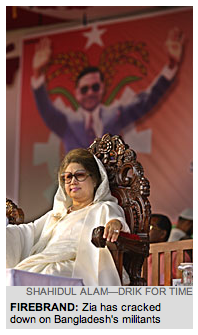
The Poverty Line
![]()
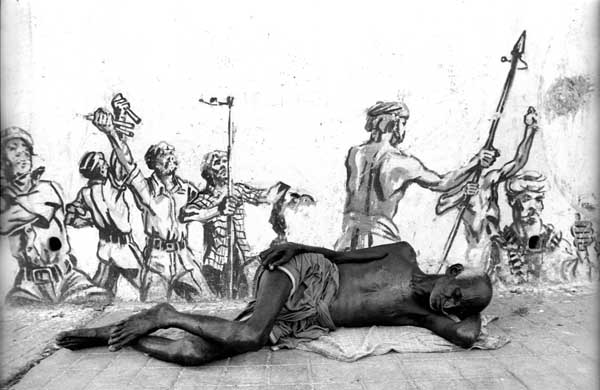
Revolution ? Pablo Bartholomew
The Poverty Line
Tarapodo Rai
I was poor. Very poor.
There was no food to quell my hunger
No clothes to hide the shame of my naked body
No roof above my head.
You were so kind.
You came and you said
‘No. Poverty is a debasing word. It dehumanizes man.
You are needy.’
My days were spent in dire need.
My needy days, day after day, were never-ending.
As I grew weaker
Again you came.
This time you said.
‘Look, I’ve thought it over,
“Needy” is not a good word either.
You are destitute.’
My days and my nights, like a deep longing sigh,
Bore my destitution.
Cowering in the burning heat,
Shivering in the cold winter nights,
Drenched in the never-ending rains.
I went from being destitute to greater destitution.
But you were tireless.
Again you came.
This time you said
‘There is no meaning to this destitution.
Why should you be destitute?
You have always been denied.
You are deprived, the ever deprived.’
There was no end to my deprivation.
In hunger and in want, year after year,
Sleeping in the open streets under the relentless sky
My body a mere skeleton
Was barely alive.
But you didn’t forget me.
This time you came with raised fist
In your booming voice, you called out to me.
Rise, rise the exploited masses.
No longer did I have the strength to rise.
In hunger and in want, my body had wasted.
My ribs heaved with every breath.
Your vigour and your passion
Were too much for me to match.
Since then many more days have gone.
You are now more wise, more astute.
This time you brought a blackboard.
Chalk in hand, you drew this glistening bright long line.
This time you had really taken great pain.
Wiping the sweat from your brow, you beckoned me.
‘Look. See this line.
Below, far below this line, is where you belong.’
Wonderful!
Profusely, Gratefully, Indebtedly, I thank you.
For my poverty, I thank you.
For my need, I thank you.
For my destitution, I thank you.
For my deprivation, I thank you.
For my exploitedness, I thank you.
And most of all, for that sparkling line.
For that glittering gift.
O great benefactor!
I thank you.
Translated from Bangla by Shahidul Alam.

